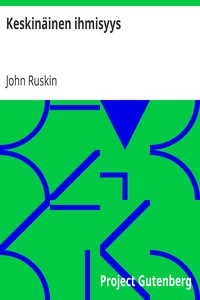Keskinäinen ihmisyys by John Ruskin
"Keskinäinen ihmisyys" by John Ruskin is a philosophical text written in the early 20th century. The work delves into concepts of humanity, the value of work, and the moral responsibilities that accompany human existence. Ruskin emphasizes the significance of labor and virtue, arguing that true happiness stems from meaningful work and the cultivation of compassion among individuals. The opening of the text introduces the central themes of human existence, categorizing experiences into
work, pain, and joy, each with its own nobility and baseness. Ruskin argues that one cannot escape the consequences of these experiences; an existence devoid of them is worthless. He posits that each individual has a divine purpose that contributes to the greater good, and he stresses the importance of performing one’s tasks with sincerity and dedication. Through rich philosophical musings, Ruskin sets the groundwork for a deeper exploration into how genuine human connection and ethical behavior intertwine with the acts of daily life. (This is an automatically generated summary.)
Read or download for free
| How to read | Url | Size | |||
|---|---|---|---|---|---|
| Read now! | https://www.gutenberg.org/ebooks/59395.html.images | 284 kB | |||
| EPUB3 (E-readers incl. Send-to-Kindle) | https://www.gutenberg.org/ebooks/59395.epub3.images | 176 kB | |||
| EPUB (older E-readers) | https://www.gutenberg.org/ebooks/59395.epub.images | 179 kB | |||
| EPUB (no images, older E-readers) | https://www.gutenberg.org/ebooks/59395.epub.noimages | 163 kB | |||
| Kindle | https://www.gutenberg.org/ebooks/59395.kf8.images | 350 kB | |||
| older Kindles | https://www.gutenberg.org/ebooks/59395.kindle.images | 336 kB | |||
| Plain Text UTF-8 | https://www.gutenberg.org/ebooks/59395.txt.utf-8 | 270 kB | |||
| Download HTML (zip) | https://www.gutenberg.org/cache/epub/59395/pg59395-h.zip | 177 kB | |||
| There may be more files related to this item. | |||||
Similar Books
About this eBook
| Author | Ruskin, John, 1819-1900 |
|---|---|
| Title | Keskinäinen ihmisyys |
| Contents | Keskinäinen ihmisyys -- Naisista -- Elämä yksin on rikkautta -- Kauneuden siunaus. |
| Credits | E-text prepared by Tapio Riikonen |
| Reading Level | Reading ease score: 31.6 (College-level). Difficult to read. |
| Language | Finnish |
| LoC Class | PR: Language and Literatures: English literature |
| Subject | English essays -- Translations into Finnish |
| Category | Text |
| EBook-No. | 59395 |
| Release Date | Apr 30, 2019 |
| Copyright Status | Public domain in the USA. |
| Downloads | 135 downloads in the last 30 days. |
| Project Gutenberg eBooks are always free! | |

